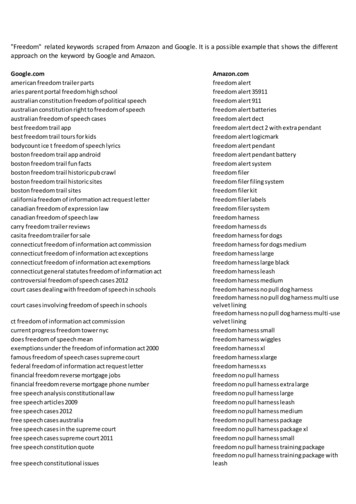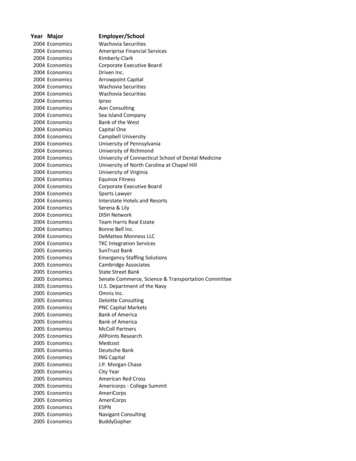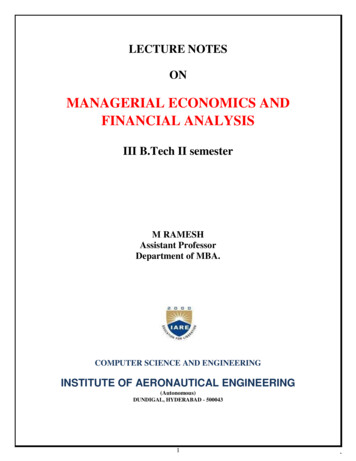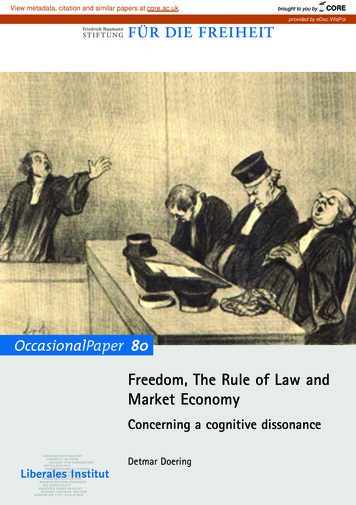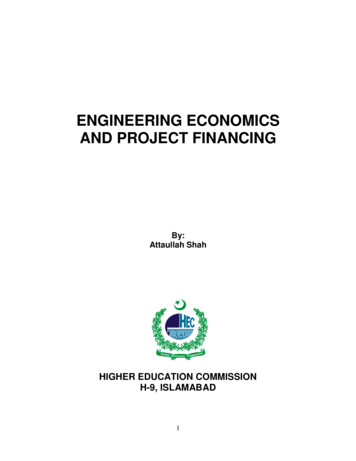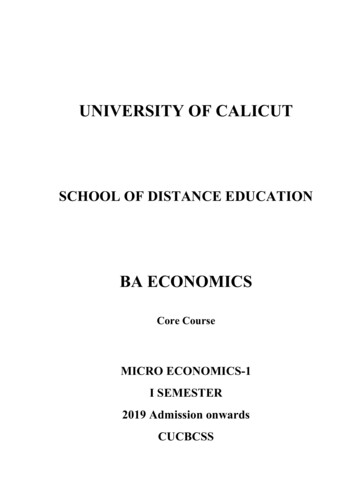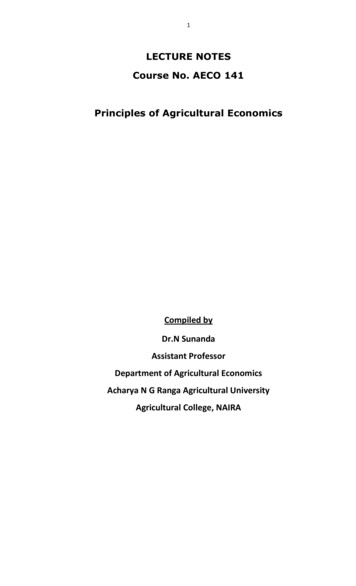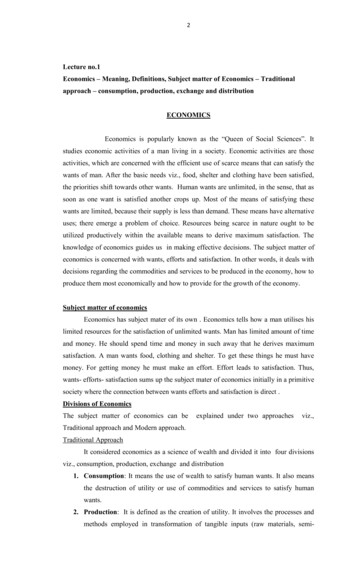
Transcription
policyexpressNo. 8-3 2008The endless variety of choices Americans enjoy daily isextraordinary—and yet so common it can be easily takenfor granted. What are the economics of choice, and whyis consumer choice a fundamental indicator of individualliberty and the condition of democratic societies?The Freedom and Economics of ChoiceAbout the AuthorKarol Boudreaux is a seniorresearch fellow at the MercatusCenter, and the lead researcherfor Enterprise Africa!, a researchproject that is investigating,analyzing, and reporting onenterprise-based solutions topoverty in Africa. In addition,she teaches a course on lawand international development atGeorge Mason University. Her mainareas of interest include propertyrights and development, humanrights, and international law.From the moment our morningalarms wake us to the moment ourheads hit the pillow at night, eachof us is confronted by an incalculablenumber of choices: what to wear, whatkind of shampoo to use, what flavor ofcoffee or tea to drink, what kind of musicto listen to, whether to see a movie orwatch cable.And these are just the mundanechoices. We are also free to makeessential life choices: should I be ananesthesiologist, an anthropologist, oran artist?Your great-grandmother wouldmarvel at the fact that you can fly halfwayaround the world in a day; that you haveover 50,000 items to choose from ina typical American supermarket, andthat you not only watch television butcan choose from hundreds of channelsthat cater to many different tastes andinterests. And amazingly, it’s a pretty goodbet that your grandchildren will havechoices that you can’t begin to imagine.Clare Boothe Luce Policy Institute112 Elden Street, Suite PHerndon, Virginia 20170P (888) 891-4288 F (703) 318-8867www.cblpi.orgWhile not everyone has exactly thesame choices, we all enjoy more choicethan our grandmothers. Two generationsago, people could not imagine—let alonechoose—a laptop or a cellphone, norcould they ‘google’ for information.More importantly, our grandparentsdidn’t have the medical choices availabletoday. If my grandmother had been able toget a CT scan or an MRI, for example, herthroat cancer might have been detectedearlier and she might have lived longer.And each year, researchers develop newtechnological innovations that will savecountless lives in the future.The wonderful world of choicewe enjoy today is made possible bythe capitalist free-market economicsystem, which has proven over time tobe the strongest engine of innovationand prosperity.Choice and self-interestChoice over so many aspects of ourlives is both extraordinarily special andyet so common that we tend to takeit for granted. Each day millions ofpeople you will never meet are makingshoes, manufacturing cars, assemblingiPods, and creating countless otherthings to give you, the consumer, achoice of products to buy. Through a
Page A World of ChoicePolicy Express No. 8-3vastly complex worldwide marketplace,these people choose to engage with youand others in a peaceful and mutuallybeneficial manner.“Each day millions ofpeople you will nevermeet are makingshoes, manufacturingcars, assemblingiPods, and creatingcountless otherthings to give you, theconsumer, a choice”of products to buy.Is it because they want you, acomplete stranger, to be happy? Theanswer is yes, and no. One of the oldestinsights of economics is that the peoplewho make things are not driven byaltruistic motives: they do it becausethey hope to make a profit and earn aliving. They do it out of self-interest.service and unhelpful workers. The DMVdoesn’t need to be particularly ‘customerfriendly’ or ‘service oriented’ since ithas no competitors. Yet even the DMVexperience is improving; many servicesare now offered online so you can avoidthe long wait and grumpy service.Why the improvement? Although theDMV still has no direct competition, itexists in a world where online transactionsare common and increasingly preferredby customers. People accustomed toTheir self-interest, at the same time, online transactions in the private sectorhelps you. The people who make and sell are likely to demand this user-friendlyyou things do so (in the vast majorityof cases) because they choose to caterto your needs and your desires. In fact,Mutual self-interestthey must provide you with somethingthat you value, otherwise you won’tThe self-interest of each party, inbuy it and they won’t make a living. Asthe voluntary exchange of goodsa result of the exchange, both you andand services, mutually benefitsthe producer are better off (otherwiseboth parties in the trade. The selleryou wouldn’t trade, would you?) and(producer) earns a profit and aliving, and the buyer (consumer)that insight—that trade benefits allreceives a product or serviceparties to the trade—is at the heart ofthat she values. This mutualfree-market economics.self-interest in the capitalistChoice and innovationeconomic system acts as a checkagainst greed and selfishness.It also means that producers arealways looking for ways to improve whatthey make or do and how they make ordo it. They innovate—making thingscheaper, faster, better or more unique—Competing worldbecause they want you to buy from themeconomic systemsrather than their competitors.Autocratic or socialist systemA world of choice is a world of(centralized economic power)—Acompetition directed at satisfying thecentral government or militarydesires of customers. In most cases,authority makes decisions about(or regulates) resource andcompanies that do not make consumersasset distribution, production,happy do not survive.and consumption for citizensA notable exception to this generalFree-market or capitalistrule occurs when producers of goodssystem (decentralized economicand services receive special protectionpower)— Authority over resourcesfromcompetition,whichoftenand assets, production, andhappens in government-controlled orconsumption is diffused to millionsregulated services.of individual citizens, who makeThe Department of Motor Vehicles,decisions for themselves.for example, has a reputation for slow
Page A World of ChoicePolicy Express No. 8-3option from protectedservices as well.governmentOr consider Microsoft. Manycomplain that the software giant is sobig and powerful that it unfairly controlsthe market for some types of computersoftware. Consumers get an inferiorproduct, they say, because Microsofthas a monopoly and is thus no longeraccountable to consumer demands.“Many fought and diedfor what they believedin, the core of whichis this: that peoplehave inalienablerights to life, liberty,”and property.United States. What makes a world ofchoice possible?A world of choicerequires freedomOur choice-saturated world is theresult of a centuries-long process toexpand freedom for ordinary people.Choice happens because of freedom andthe institutions that support freedom.For most of this history, power wascentralized among a powerful few cultural,religious, or military elites. Typically,social status was unchangeable: the poorremained poor; women remained inthe background; and outsiders (ethnic,religious, or cultural outsiders) wereInterestingly, Microsoft’s enormous shunted to one side or victimized. Whosuccess has another benefit to consumers. you were and who you were related to wasBecause Bill Gates and his colleagues more important than what you could do.have succeeded so splendidly, they inspireIn the European experience, theother entrepreneurs to take risks and emphasis on one’s “place” or status increate new innovative products, such as society began to change centuries agoGoogle, eBay, MySpace, and Facebook.when some people fled the countryside andBut big doesn’t equal monopoly. Aslong as Apple is free to compete withMicrosoft, it can—and increasinglydoes—draw consumers by offeringan attractive quality product at acompetitive price.While we tend to take our choicesfor granted, a world with so much choiceis not the normal state of affairs. Mostpeople throughout history lived with farfewer choices. And today in much of themodern developing world, people havefar fewer choices than those living in thefeudal manors for the freedom of cities.In medieval cities two importantthingshappened.First,peoplecongregated together and were thusbetter able to make use of their individualtalents and to trade with others withInstitutions necessary to a capitalist economic systemRule of Law—adherence to rules protecting inalienable rights of life, liberty,and propertyClear Contracts in Open Markets—clear rules for voluntary agreements between producers and consumersIndividual Property Rights—the individual’s right to own—and profit from—hisor her assets: material resources, land and natural resources, skills and talentsIndividual Responsibility—the duty to respect the life, liberty and property of othersDemocracy & CapitalismDeveloped over centuries, democracy and free-market capitalism go hand-inhand, each one the guarantor of the other.
Page A World of ChoicePolicy Express No. 8-3different talents. More people withdiverse talents—some of whom couldbake, some of whom could brew beer,some of whom could build furniture,etc.—meant more could be produced.Economists call this a “division of labor,”and a bigger division of labor meansmore consumer choice for everyone.“Rules against injuryto people and theirproperty—damage,fraud, and theft—areall essential to keepthe bad or carelessinclinations of some”from harming others.Second, as division of labor andtrade expanded, some people—typicallymerchants—recognized the need forbetter trading rules and a more secureenvironment in which to trade. So theydeveloped the framework and institutionsto meet their needs.liberty, and property of others, regardlessof their status.Put simply, the framework for aworld of choice is freedom. But whatare the rules that people need to tradewith each other and that tend to keepsocieties peaceful?Simple rules for a complexcapitalist economic systemRichard Epstein, a well-known lawprofessor at the University of Chicago,published a book more than a decadeago entitled Simple Rules for a ComplexWorld. He argues that the modern worldis over-full of laws and regulations andthat society would be better off with fewerrules that are clearly understood by all.The process was slow, and manyfought and died for what they believedin, the core of which is this: that peopleThe “simple rules” he suggests wehave inalienable rights to life, liberty,adopt, or return to, are largely the rulesand property, and that coupled withthat developed in early-modern Europethese rights is the duty to respect the life,to promote trade and protect people’sExamples of threats to capitalist free-market economiesGovernment confiscation of property:Eminent domain—i.e., government’s power to seize private propertywithout the owner’s consent—has traditionally been used to appropriateland for public projects such as highways and public utility lines. In the2005 Kelo case, the U.S. Supreme Court ruled that governments could alsouse eminent domain to take private property from one citizen and give it toanother for private projects. Responding to public outrage, 42 states thusfar have passed some type of reform to limit government’s use of eminentdomain and restrict the seizure of private property.Nationalization—This occurs when a government takes controlof a business and operates the business in place of a private owner.Nationalizations are a form of “taking” and owners rarely receivecompensation for their losses. Companies that extract minerals from theearth and that have the potential to generate large profits, such as miningor oil companies, are often targets of nationalization.Government regulation—In the 1970s the price of gasoline shot up. The U.S.government responded by capping the price gasoline retailers could chargeper gallon. Although the dollar/gallon price was fixed, people “paid” with theirtime, routinely waiting hours in line for a few gallons of gas.Tariffs and other trade barriers—Tariffs are a tax on imports that make itmore expensive for consumers to buy foreign goods. They also raise costs forbusinesses that use imported products.
Page A World of ChoicePolicy Express No. 8-3liberty—namely Rule of Law, clearcontract rules and norms, secure rightsto private property, and rules that holdpeople responsible if they harm others.A Rule of Law means that peopleare equal before the law, that no oneperson or group is above the law. A Ruleof Law requires an impartial judiciaryand police force; it also requires thatgovernment respect and enforce therights of its citizens and not behave in anarbitrary manner. A functioning Rule ofLaw makes citizens more secure in theirperson and in their property.Contract rules help people trade inways that are mutually beneficial andallow them to plan their actions withgreater certainty. All parties know whatto expect and what to do if one partybreaches the contract. When contractingrules are clear, well-known, and enforced,it is easier and less costly for peopleto trade and, in turn, it is easier foreconomies to grow.policyexpressPublished by the Clare Boothe LucePolicy Institute, Policy Express isdesigned to deliver concise, fact-filledpolicy briefs authored by the bestcontemporary thinkers on today’shottest topics and issues. Copyright 2008Clare Boothe Luce Policy InstituteBut people cannot trade unless theyhave secure rights to property. Propertyrights give an owner freedom to use theproperty in ways that she finds valuableso long as she does not harm others.Property rights are a basic human right.They are the foundation for trade, fordecentralizing power, and for peace andprosperity. Markets exist because peoplehave rights over the property they hold(i.e., land, natural resources, intellectualproperty, information, and skills), andthey have the freedom to trade theirproperty with others who value themmore than they do.Finally, rules are needed to holdpeople responsible for the harm theycause to others, whether these harms areunintentional or intentional. Rules againstinjury to people and their property—damage, fraud, and theft—are all essentialto keep the bad or careless inclinations ofsome from harming others.If these rules exist, and if theyare enforced impartially, a world ofchoice can develop. But if these rulesare absent—or if they are poorly orarbitrarily enforced, or limited by a mazeof government regulation—then choiceand the freedom that makes choicepossible will suffer.Protecting our world of choiceLet me emphasize that these rulesare not important just because theyallow us to choose from six differentkinds of orange juice at the grocery store.These rules are necessary to keep powerfrom being concentrated in the handsof a few people to the harm of manyordinary people.Ultimately our world of choice—which is simply a capitalist free-marketworld of people trading voluntarily inmarkets—is a world of decentralizedpower where individuals can decidewhat is best for them and their familiesand where people face less predation,less oppression, and where most peopleinteract peacefully.Protecting and expanding anenvironment in which people are free—free to trade with others, to seek theirpaths in life, to flourish as they see fit—can be difficult, but it is the path thatholds the greatest promise for us as wellas the billion people in this world whostill live in desperate poverty.Resources:2008 Index of Economic Freedom, Heritage Foundation, dex.cfm“Doomsday? No Way: Economic Trends and Post-Kelo Eminent Domain Reform,” Institutefor Justice www.ij.org/publications/other/doomsday.html
Clare Boothe Luce Policy Institute 112 Elden Street, Suite P Herndon, Virginia 20170 P (888) 891-4288 F (703) 318-8867 www.cblpi.org policyexpress No. 8-3 2008 Karol Boudreaux is a senior research fellow at the Mercatus Center, and the lead researcher for Enterprise Africa!, a research project that is investigating, analyzing, and .


